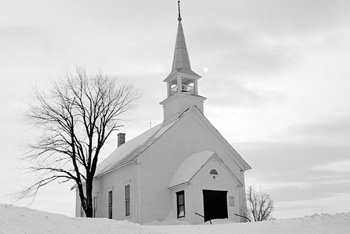 June 5, 2013 – It’s graduation time. And as high school graduates ponder their futures this month, the U.S. Supreme Court is still pondering whether Wisconsin’s Elmbrook School District violated the constitution by holding high school graduations in a church.
June 5, 2013 – It’s graduation time. And as high school graduates ponder their futures this month, the U.S. Supreme Court is still pondering whether Wisconsin’s Elmbrook School District violated the constitution by holding high school graduations in a church.
According to SCOTUS blog, the nation’s high court “relisted” Elmbrook School District v. John Doe et al. six times for discussion at its weekly court conferences through May 16, 2013, with no decision on whether to grant certiorari or not.
Relisting is a request “to have a case ‘put over’ to the next conference at which requests to review the decisions of lower courts will be reviewed or denied.”1
Lori Lubinsky, an attorney at Axley Brynelson LLP in Madison and local counsel for Elmbrook School District, says “it’s highly unusual to be relisted multiple times, and what it means is only speculative. But it’s an indication the case is getting a hard look.”
Alex Luchenitser, attorney for Americans United for Separation of Church and State in Washington D.C. and counsel of record for the former students and parents who sued the district, says the case may be on hold pending another Establishment Clause case.
The court stopped relisting Elmbrook School District after accepting Town of Greece v. Galloway, Luchenitser says, a case in which two residents in a New York town sued to stop the decade-old practice of having local clergy recite prayers before town meetings.
“It’s possible a decision in Greece could have some kind of impact, which is why the Supreme Court apparently decided to hold the Elmbrook case,” said Luchenitser, speculating. “Likely, they’ll take another look at Elmbrook once they decide Greece.”
Assuming Greece is the reason for delay, a decision on whether the court will hear Elmbrook will be on hold for a while. Greece won’t be decided until the U.S. Supreme Court’s next term, which begins in October and ends in June 2014.
How It Got Here
Beginning in 2000, high school students at Brookfield Central, a public high school in the western Milwaukee suburb of Brookfield, pushed to move graduation ceremonies to another location, complaining that the gym was too hot and overcrowded in June.
Of the venues considered, Elmbrook Christian Church was chosen year after year. Both Brookfield Central and East high schools held graduations there from 2002 to 2009.
Joe Forward is the legal writer for the State Bar of Wisconsin. He can be reached by email or by phone at (608) 250-6161.
A large Latin cross loomed in the church’s sanctuary, where the graduations were held, as did other religious symbols and fixtures. The church refused to cover any religious images as a matter of policy. During some graduations, members of the church passed out evangelical literature in the church’s lobby, which contained religious decorations.
Ultimately, a group of non-Christian students, former students, and their parents, sued to stop the school district’s practice of holding graduation ceremonies in the church. Holding graduations there, they argued, coerced unconstitutional exposure to religion.
The Establishment Clause (U.S. Const., amend. I, cl. 1) prohibits government actors, such as school districts, from making laws “respecting an establishment of religion.”
Violations occur if an action lacks a legitimate secular purpose, has the primary effect of advancing or inhibiting religion, or fosters an excessive entanglement with religion, the so-called Lemon test adopted in Lemon v. Kurtzman, 403 U.S. 602 (1971).
As of 2010, the school began holding graduations in a newly built fieldhouse, but the plaintiffs wanted a permanent injunction to ensure future graduations would remain outside church walls. In addition, the plaintiffs wanted damages for past grievances.
The plaintiffs lost in district court. A three-judge panel for the U.S. Court of Appeals for the Seventh Circuit affirmed in 2011, concluding the school district’s use of rented church space was “neither impermissibly coercive nor an endorsement of religion.”
However, a majority (7-3) en banc Seventh Circuit Appeals Court reversed course in July 2012, when it concluded that “an unacceptable amount of religious endorsement and coercion occurred.” The decision prompted the school district’s high court appeal.
“The district is convinced, just as it was from the beginning, that a decision to hold graduations in the church was done for proper purposes and conforms with the First Amendment,” said Lubinsky, whose client filed a petition for review last year.
If the lower court’s decision is allowed to stand, the school district argues, “it would unsettle longstanding practices in public schools across the country and expose governments to liability for a host of common practices.”
But Luchenitser says the case should not be granted. “No other federal appellate court has considered the issue of whether a public school can hold graduations in a house of worship,” he said. “Normally, the Supreme Court only hears an issue if the federal circuits have reached divergent decisions on the same issue.”
He noted that the school district will be liable for damages and attorney’s fees if the Supreme Court denies review and the Seventh Circuit’s en banc decision stands.
Endnotes
1 Spaeth, Harold J., Relisting: An Examined Feature of Supreme Court Decision Making, The Justice System Journal, Vol. 25, No. 2 (2004).
Related
